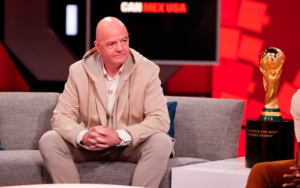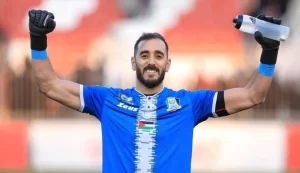The headlines since the 2021 FIFA Arab Cup have been dominated by one player and one player alone. Hosam Aiesh. The Swedish born winger/wing back was the subject of much speculation throughout 2017 and 2018 after he formally declared for Palestine.
Then came the excuses. Every time there was an opportunity to cap him an injury would get in the way or his club would step in or it wouldn’t be the right time.
This just led to more speculation about why Hosam Aiesh never did get around to donning a Palestine jersey. Was he scared off by Palestine’s sudden managerial changes in 2018? Did the PFA forget about his existence?
Aiesh could have very well been part of Palestine’s 2019 AFC Asian Cup squad but he chose to chase Sweden and got a call up to their B-team at around the same time. It’s one thing to choose the nation of your birth over the nation of your ancestors, it’s another thing entirely to accept a call-up to a country you have a very loose affiliation to.
In 2022, that is exactly what happened. Aiesh got his hands on a Syrian passport despite the fact that he isn’t eligible for one according to Syrian law. After another weird excuse prevented him from making his debut against UAE he came off the bench against Korea Republic in a game that extinguished Syria’s Qatar 2022 qualification hopes.
There is no way back. Hosam Aiesh is a Syria player.
Why Hosam Aiesh spurned Palestine
Hosam Aiesh has never clarified why he chose to take any decisions in regards to his national team allegiance. When he made his decision to play for Palestine he famously said that he “followed his heart.”
A year and a half later he was in a Sweden jersey. Three years after that, he chose Syria.
Why?
Multiple sources confirmed to Football Palestine that Aiesh’s father detests Jibril Rajoub and that might have colored his son’s decision to change his initial decision. Hosam Aiesh himself is known to be something of a mercurial individual and his avoidance of a Palestine cap for 18 months is evidence of that.
When questioned about that at the time, Hosam Aiesh told sources that playing for Palestine would “effect his sponsorships”.
Syria did a lot of heavy lifting to attract Aiesh but they approached a player whose ego had been in check after his career flat lined. The player who turns 27 in April and whose contract runs out in December will most likely use his presence in the Syria squad to net a big money deal in the Gulf in 2023.
Is this really a negative thing for Palestine?
One constant in the Palestine camp is the mutual respect that exists amongst the players. There are no open feuds and even when there is a decent amount of discontent the players put it aside and focus on the task at hand.
That spirit has prevented the bottom from falling out for Palestine. The Noureddine Ould Ali tenure was disastrous but Palestine still managed to record a famous win against Uzbekistan in World Cup qualifying, beat Kuwait for the first time ever, and register their best WAFF Championship campaign.
Pursuing players born outside of Palestine has been crucial to the country’s progress but perhaps more important has been the dressing room harmony. Foreign born players don’t always walk into Palestine’s starting XI and there is a mutual respect between players like Saleh Chihadeh (developed in Europe), Oday Dabbagh (developed in Palestine but plays abroad), and Rami Hamadi (a WBPL lifer).
Throw in some primadonna personalities and overinflated egos and the X-factor that makes this team special would be gone.
Aiesh is not as good as he thinks he is. He is also not as good as we thought he could be four and a half years ago. That famous Ostersunds FK squad? Saman Ghodos, Ken Sema, and manager Graham Potter went to the Premier League. Aiesh stayed in the Allsvenskan and never did build on a breakout season in 2018 that saw him produce five goals and 15 assists in 33 appearances across all competitions.
What happened? Well, Graham Potter left. Then Aiesh went to IFK Goteborg. His goal involvements since 2018? In decline with every passing year (9, 7, 6).
If there is one position Palestine has covered it’s the wing and even as a right back it’s hard to see Aiesh getting into the side ahead of Musab Al-Battat.
Palestine’s loss is not even Syria’s gain. It might be too early to write off his international career but Syria is in a deep crisis. There presence in the final round of World Cup qualifying masked a lot of shortcomings as they posted a 100% record against Philippines, Maldives, and Guam and only had to contend with an equally dysfunctional China to get to Round 3.
Two points from eight games is a truly shambolic record especially given the talent at Syria’s disposal. In tournament play, things haven’t been much better. They finished bottom of the group with losses to Palestine and Lebanon in the 2019 WAFF Championship. At the Arab Cup in December, Syria threw away a golden chance at advancing to the knockout stage by losing to Mauritania.
What will Aiesh’s presence do to stop the crisis? Is he really capable of doing something that Khribin, Al-Soma, Mawas, Weiss, Osman, Othman, could not do in recent history? His declining performances in the Allsvenskan don’t give any indication of that being the case.




